Related Research Articles

Mad is an American humor magazine first published in 1952. It was founded by editor Harvey Kurtzman and publisher William Gaines, launched as a comic book series before it became a magazine. It was widely imitated and influential, affecting satirical media, as well as the cultural landscape of the 20th century, with editor Al Feldstein increasing readership to more than two million during its 1973–1974 circulation peak.
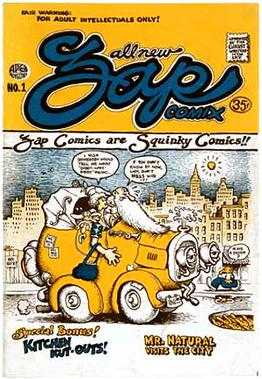
Underground comix are small press or self-published comic books that are often socially relevant or satirical in nature. They differ from mainstream comics in depicting content forbidden to mainstream publications by the Comics Code Authority, including explicit drug use, sexuality, and violence. They were most popular in the United States in the late 1960s and 1970s, and in the United Kingdom in the 1970s.

The Monthly Review is an independent socialist magazine published monthly in New York City. Established in 1949, the publication is the longest continuously published socialist magazine in the United States.
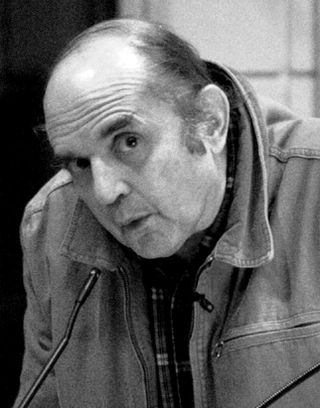
Harvey Lawrence Pekar was an American underground comic book writer, music critic, and media personality, best known for his autobiographical American Splendor comic series. In 2003, the series inspired a well-received film adaptation of the same name.
Manuel Rodriguez, better known as Spain or Spain Rodriguez, was an American underground cartoonist who created the character Trashman. His experiences on the road with the motorcycle club, the Road Vultures M.C., provided inspiration for his work, as did his left-wing politics. Strongly influenced by 1950s EC Comics illustrator Wally Wood, Spain pushed Wood's sharp, crisp black shadows and hard-edged black outlines into a more simplified, stylized direction. His work also extended the eroticism of Wood's female characters.

Harvey Kurtzman was an American cartoonist and editor. His best-known work includes writing and editing the parodic comic book Mad from 1952 until 1956, and writing the Little Annie Fanny strips in Playboy from 1962 until 1988. His work is noted for its satire and parody of popular culture, social critique, and attention to detail. Kurtzman's working method has been likened to that of an auteur, and he expected those who illustrated his stories to follow his layouts strictly.

Weirdo was a magazine-sized comics anthology created by Robert Crumb and published by Last Gasp from 1981 to 1993. Featuring cartoonists both new and old, Weirdo served as a "low art" counterpoint to its contemporary highbrow Raw, co-edited by Art Spiegelman.
The New Leader (1924–2010) was an American political and cultural magazine.

Little Annie Fanny is a comics series by Harvey Kurtzman and Will Elder. It appeared in 107 two- to seven-page episodes in Playboy magazine from October 1962 to September 1988. Little Annie Fanny is a humorous satire of contemporary American society and its sexual mores. Annie Fanny, the title character, is a statuesque, buxom young blonde woman who innocently finds herself nude in every episode. The series is notable for its painted, luminous color artwork and for being the first full-scale, multi-page comics feature in a major American publication.

Signs: Journal of Women in Culture and Society is a peer-reviewed feminist academic journal. It was established in 1975 by Jean W. Sacks, Head of the Journals Division, with Catharine R. Stimpson as its first editor in Chief, and is published quarterly by the University of Chicago Press. Signs publishes essays examining the lives of women, men, and non-binary people around the globe from both historical and contemporary perspectives, as well as theoretical and critical articles addressing processes of gendering, sexualization, and racialization.

Humbug is a humor magazine published from 1957 to 1958. Edited by Harvey Kurtzman, the magazine took satirical jabs at movies, television, advertising and various artifacts of popular culture, from cereal boxes to fashion photographs. Nine of the eleven issues were published in a black-and-white comic book-sized format.

New Masses (1926–1948) was an American Marxist magazine closely associated with the Communist Party USA. It succeeded both The Masses (1912–1917) and The Liberator (1918–1924). New Masses was later merged into Masses & Mainstream (1948–1963). With the coming of the Great Depression in 1929 America became more receptive to ideas from the political Left and New Masses became highly influential in intellectual circles. The magazine has been called “the principal organ of the American cultural left from 1926 onwards."
Dartmouth College and its students publish a number of journals, reviews, and magazines, including the Aegis and the Dartmouth Law Journal, a nationally recognized law publication run by undergraduate students.
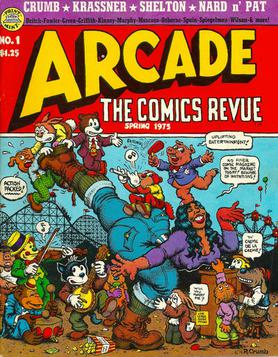
Arcade: The Comics Revue is a magazine-sized comics anthology created and edited by cartoonists Art Spiegelman and Bill Griffith to showcase underground comix. Published quarterly by the Print Mint, it ran for seven issues between 1975 and 1976. Arriving late in the underground era, Arcade "was conceived as a 'comics magazine for adults' that would showcase the 'best of the old and the best of the new comics'". Many observers credit it with paving the way for the Spiegelman-edited anthology Raw, the flagship publication of the 1980s alternative comics movement.
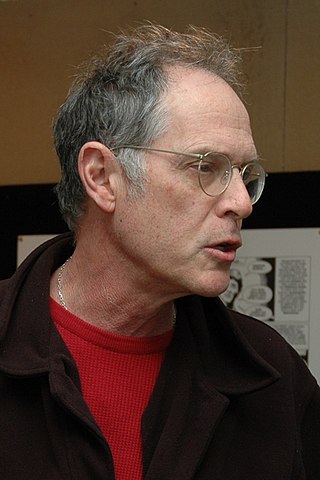
Paul Merlyn Buhle is an American historian, who is (retired) Senior Lecturer at Brown University, author or editor of 35 volumes, including histories of radicalism in the United States and the Caribbean, studies of popular culture, and a series of nonfiction comic art volumes. He is the authorized biographer of C. L. R. James.
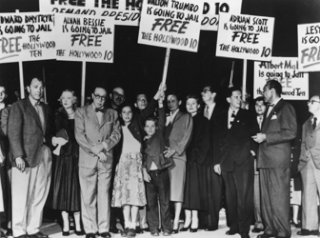
The Hollywood blacklist was an entertainment industry blacklist put in effect in the mid-20th century in the United States during the early years of the Cold War, in Hollywood and elsewhere. Actors, screenwriters, directors, musicians, and other American entertainment professionals were barred from work by the studios.
The La Guardia and Wagner Archives was established in 1982 at LaGuardia Community College in Long Island City, Queens, New York, to collect, preserve, and make available primary materials documenting the social and political history of New York City, with an emphasis on the mayoralty and the borough of Queens. The purpose of its founding went beyond serving as a repository, but to establish the college as a location for scholarly research. The archives serves a broad array of researchers, journalists, students, scholars, exhibit planners, and policy makers. Its web site provides guidelines to the collections, as well as over 55,000 digitized photographs and close to 2,000,000 digitized documents.
The New Left was a broad political movement that emerged from the counterculture of the 1960s and continued through the 1970s. It consisted of activists in the Western world who campaigned for a broad range of social issues such as feminism, gay rights, drug policy reforms, Statism, Neo-Marxism and the rejection of traditional family values, social order, and gender roles. The New Left differs from the traditional left, in that it tends to lean more in favor of social justice compared to previous eras. However, others have used the term "New Left" to describe an evolution, continuation, and revitalization of traditional leftist goals.

American cartoonist Harvey Kurtzman was the founding editor and primary writer for the humor periodical Mad from its founding in 1952 until its 28th issue in 1956. Featuring pop-culture parodies and social satire, what began as a color comic book became a black-and-white magazine with its 24th issue.
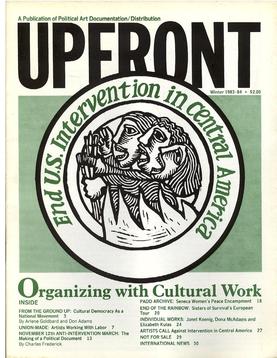
Political Art Documentation/Distribution (PAD/D) was an American leftist art collective based in New York City and dedicated to artistic activism. Their primary aim was to "provide artists with an organized relationship to society, to demonstrate the political effectiveness of image making, and to provide a framework within which progressive artists can discuss and develop alternatives to the mainstream art system." The collective was active from around 1980 to 1988, when its 501(c)(3) non-profit status formally expired, and was based out of 339 Lafayette Street for several years. PAD/D was originally founded by Lucy Lippard, Margia Kramer, and Gregory Sholette, among others.
References
- ↑ Denning, Michael (1990). "The End of Mass Culture". International Labor and Working-Class History. 37: 4–18. doi:10.1017/S0147547900009868. S2CID 145523459.
- 1 2 Buhle, Paul (2005). "Cultural Correspondence, 1975–83". Brown University Center for Digital Studies. Archived from the original on June 21, 2019. Retrieved June 21, 2019.
- ↑ "Cultural correspondence No. 1". repository.library.brown.edu. 1975. Retrieved 2024-02-08.
- ↑ Murray, Jim (1999). "The C. L. R. James Institute and me". Interventions: International Journal of Postcolonial Studies. 1 (3): 396. doi:10.1080/13698019900510601.
- ↑ Shephard, Richard (April 22, 1982). "Going Out Guide". New York Times . New York. Archived from the original on June 21, 2019. Retrieved June 21, 2019.
- ↑ Sholette, Gregory (2011). Dark matter : art and politics in the age of enterprise culture . Pluto Press. p. 53. ISBN 9780745327525.
- ↑ We will not be disappeared! : directory of arts activism. WorldCat. OCLC 11671576.